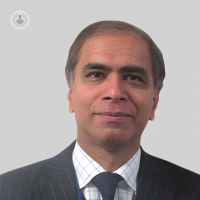How serious is a fatty liver?
Written by:Fatty liver is a condition caused by the accumulation of fat in the liver cells. It is increasingly recognised in the western world, affecting more than 33 per cent of adults. Fatty liver disease is considered present when more than 5 per cent of liver cells are laden with excess fat.
Professor Aftab Ala, renowned consultant gastroenterologist and hepatologist, provides an overview of the condition and what we can do to prevent this disease from progressing.

What causes fatty liver?
In the majority of cases, fatty liver occurs in people who are overweight, those who have a high-calorie intake, consume excess fructose and live a sedentary lifestyle. This condition is also associated with diabetes mellitus, insulin resistance and raised lipid levels in the blood.
If fatty liver isn’t addressed, it can scar the liver and progress to more serious conditions and health problems.
What are the symptoms of fatty liver?
Most people with fatty liver show no symptoms. It is often diagnosed after performing a liver test or an ultrasound scan of the liver.
If fatty liver remains undetected, then the patient might start showing symptoms of cirrhosis. Some of these symptoms include tiredness, jaundice, loss or lack of appetite, weight loss, bleeding easily and swelling in the legs.
How can it be diagnosed?
Fatty liver is typically diagnosed after performing a routine blood test of the liver. People who are overweight or have diabetes are often advised to have their liver checked by having their blood tested and an ultrasound scan done of the liver.
The condition leads to inflammation of the liver cells which would cause abnormal liver test results. Up to 5 per cent of people with fatty liver will show abnormal liver test results, which is how it is normally detected.
If the liver tests show an abnormality, the person will need to be referred to a gastroenterologist for further evaluation in order to rule out other causes of the abnormal liver results. The patient will also need to be assessed for any damage to the liver by using a scan called FibroScan® and having blood tests to look for any scarring on the liver.
How to treat a fatty liver?
Unfortunately, whilst there is no agreed curative treatment for fatty liver, there is significant work in clinical trials in this area and emphasis should be on prevention by adopting a healthy lifestyle.
In people who are overweight, there are opportunities to be assessed in weight management clinics which offer comprehensive advice about lifestyle and weight management. If a person can lose at least 10 per cent of their weight, it has been shown to improve liver function.
There are certain drugs that can benefit in established cases of fatty liver, particularly when the liver tests are abnormal. The patient will need to see a gastroenterologist who specialises in liver disease to justify the use of these drugs.
There are some newer drugs under active research for fatty liver and these may be available in the future.
If you are concerned about fatty liver, arrange a consultation with Professor Aftab Ala, an expert in fatty liver, liver disease, liver function tests and FibroScan®, via his Top Doctors profile today.


